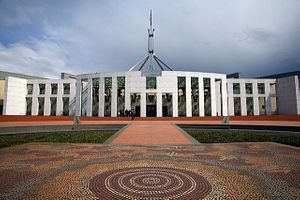In the past week two Australian senators have resigned their positions after discovering that they hold dual citizenship with another country. The two senators — Larissa Waters and Scott Ludlam — were apparently unaware that they were dual citizens. Waters had been born to Australian citizens who were studying in Canada; Ludlam moved to Australia when he was a child and believed his naturalization as an Australian in his teens nullified his New Zealand citizenship.
Although place of birth is not a requirement to serve in any capacity in the Australian Parliament (there have been a number of foreign-born prime ministers), Article 44(i) of the country’s constitution disqualifies anyone holding dual citizenship from being a member of parliament.
The text reads:
Any person who –
(i.) Is under any acknowledgement of allegiance, obedience, or adherence to a foreign power, or is a subject or a citizen or entitled to the rights or privileges of a subject or citizen of a foreign power:
…shall be incapable of being chosen or of sitting as a senator or a member of the House of Representatives.
The Australian Constitution, as well-constructed as it was and mostly remains, still contains values and concepts from the time it was written in the late 1890s, which are increasingly out of step with modern Australia. Interestingly, the two countries in question that the senators are dual citizens of (New Zealand and Canada) would have not been considered “foreign” (both legally and spiritually, as part of the British Empire) when the constitution came into force in 1901, yet are considered so today.
This adds an extra layer of historical intrigue to this issue as the definitions of sovereignty have shifted to become more exclusive during an era when the world has become far more integrated. Those constructing the constitution could not have envisaged both of these phenomena, especially as they have taken place simultaneously.
Ironically, both Canada and New Zealand allow dual citizens to be elected to their parliaments. Recent Canadian foreign minister, Stéphane Dion, is one example; Canada remains a well-functioning country (one could argue it functions better than most).
Beyond concepts of sovereignty, the practical realities of modern Australia make this law one that limits democratic participation. The recent release of data from the 2016 census indicated that 49 percent of the population of Australia were either not born in the country or have a parent who was not born in the country. This statistic highlights that there is a likelihood of a large percentage of dual (or multiple) citizenship holders in the country. This significantly lowers the pool of potential candidates for parliamentarians in Australia, especially those who have essential transnational links and knowledge. It also hampers the ability of the Australian Parliament to be truly representative of the current Australian public.
Some potential parliamentarians may be reluctant to run for office as renouncing another citizenship has the potential to reduce the future opportunities of any children they may have. That again reduces the talent pool.
Of course not every country allows dual citizenship. India and China combined have comprised 27 percent of Australia’s immigration intake over the past decade, yet both these countries do not allow dual citizenship. However, India has a category called Overseas Citizen of India (OCI) which does afford certain “rights and privileges” that could be in conflict with the ambiguous wording of the constitution. Political parties may not take the risk in promoting anyone for election who may hold OIC status due to this legal ambiguity. This presents a problem for a rapidly growing community in Australia, and a potential hindrance to the increasingly essential Australia-India relationship.
Within the concept of this law remains a suspicion of people who have links to other regions of the world. This is not just on an individual level, as banning those with dual citizenship from holding public office is also an implicit argument that states lack the ability to engage in mutually beneficial, trust-building, cooperative behavior. It maintains the perspective of a world filled with “hostile states” (and their subversive agents), even though since the end of the Cold War the number of states that could be deemed as such by Australia has significantly decreased (even taking into account the recent rise in parochial populism).
This, of course, is a self-fulfilling prophecy as this ban on dual citizenship in the parliament limits the ability of actors within the government to enhance the cooperative behavior between states. It fails to see the international links of the Australian public as assets that provide the relationships, cultural knowledge, and language skills that could be of great value to Australia’s interests.
As a country with a small population of only 24 million people, Australia does not have the human resources to maintain such exclusive access to its institutions. With a small internal market, and a distant geography, the country requires highly active transnational actors to facilitate its international links (both trade and diplomatic).
While the resignation of these two senators has brought the issue to light, the Australian Constitution can only be amended by referendum, and the current emotive political environment would make it very difficult for a mature and rational debate to be held on this issue. Therefore Australia will continue to limit the numbers of those able to serve in its Parliament, prevent an accurate representation of the nation’s makeup, and hinder its own ability to engage more constructively with the rest of the world.

































